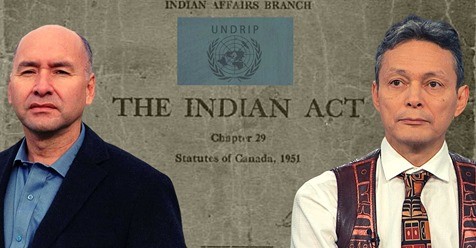
Giving credits to the original article it can be found here. We felt this article was so relevant to the people of the Bulkley Valley, both Wet’suwet’en as well as those who made this area a home for generations to live here. Most of the problems we now face thanks to Federal and Provincial negotiators are the root the evils that are ripping the Wet’suwet’en apart, pitting family against family and stirring the pot of racism to levels seldom seen in our history here in the valley.
Calvin Helin & Ellis Ross: Why some First Nations & Métis oppose UNDRIP & the Indian Act
The National Telegraph recently interviewed Calvin Helin, an Indigenous author, public speaker and entrepreneur, and Ellis Ross, MLA for Skeena in northwest British Columbia, in order to hear their personal explanations for the mounting opposition against both the United Nations’ Declaration on the Rights of Indigenous Peoples (UNDRIP) and the Indian Act.
“Concerning the Indian Act,” Helin began, “what you should know is that it has been used to deny us [First Nations] our rights since the beginning. Anachronistically, you might deem it a type of colonial socialism that has been imposed upon us since 1876.”
“Much like a command economy, wealth is distributed in the form of transfer payments—as a result, that famous Soviet maxim still applies today in Canada’s Indigenous communities: we pretend to work, and they pretend to pay us.” – Calvin Helin
“The provisions of the Indian Act have also created what I like to call a ‘kabuki-theater’ style government for Indigenous people at the national level, where showmanship is prioritized over actual content. Our national Indigenous leaders are a ‘pretend-government’ put in place to control us, and we consequently pretend they have power, but when the federal government tells them to jump, they ask: “How high?”
“Real power requires self-reliance, and the capacity to build up our own society in a modern economy necessitates the generation of our own revenues. Although we have some great local leaders that have managed to accomplish this, we will always be reined in by the limited confines of the Indian Act that are designed to keep us subservient.”
Ross’s statement largely overlapped with Helin’s. “The Indian Act put our people into poverty in the first place,” Ross noted, “However, I’d like to add that it is not the white man who continues to enforce this lifestyle, but our own aboriginal leaders who encourage our destitution.”
“We have the ability to succeed in our own right, but it is our leaders who perpetually hold us back.” – Ellis Ross
“I’m not going to call out specific names, but our provincial and national representatives alike continue to show up at blockades and protests, opposing development in mining, oil and gas, all of which can generate the wealth we so desperately need. In the end, it is through economic development that we will achieve the greater autonomy we have sought since the beginning.”
“Through this, we can open these ancient restrictions [Indian Act] that have restricted both the community and the individual. In communities like my own, poverty, welfare and substance abuse have started to become a thing of the past, as my own generation has—broadly speaking—become the last to suffer from these systemic abuses. Nowadays, I see how economic development has opened up possibilities for my community that I could have never thought possible. I’ve seen youth get mortgages on reserve, building their own homes on reserve without council involvement—even taking a vacation to Mexico.”
Given the fact that UNDRIP allegedly offers a ‘pathway to building better Indigenous communities…and seems to be a cause worth rallying around for First Nations leaders [as] a powerful resistance to Canada’s Indian Act,’ we at TNT were perplexed to learn how this too was viewed with mistrust at best, or utter disdain at worst. Ross offered clarification.
“It’s a vague, general document meant for career politicians to pretend that they’re doing something,” Ross argued. “It serves no purpose. UNDRIP is all about things Canada’s already done. It seeks to place aboriginal issues back in the forefront of the political arena, which will give a good paycheck for aboriginal and white leaders who want to play to this form of identity politics.”
“Overall, it does nothing for the average aboriginal who wants to get out of poverty. Things like UNDRIP ultimately serve to bolster a ‘divide-and-conquer’ narrative, which we should never play to. We [First Nations] are slowly starting to unite on an economic front. Historically, my reserve used to not get along with its neighboring communities, until we eventually started inviting them in for contracts and jobs. We realized that mutual cooperation was the best solution to reducing poverty.”
“UNDRIP seeks to stamp out this entrepreneurial spirit, returning back to ‘talking the talk’ rather than ‘walking the walk’ as we’ve successfully done over the last decade.”
"Now you know the rest of the story"
brought to you by
"Two Feathers"

In the event we are using copyrighted material, we are doing so within the parameters of the Fair Dealing exception of the Canadian Copyright Act.
See our Copyright Notice

Leave a Reply